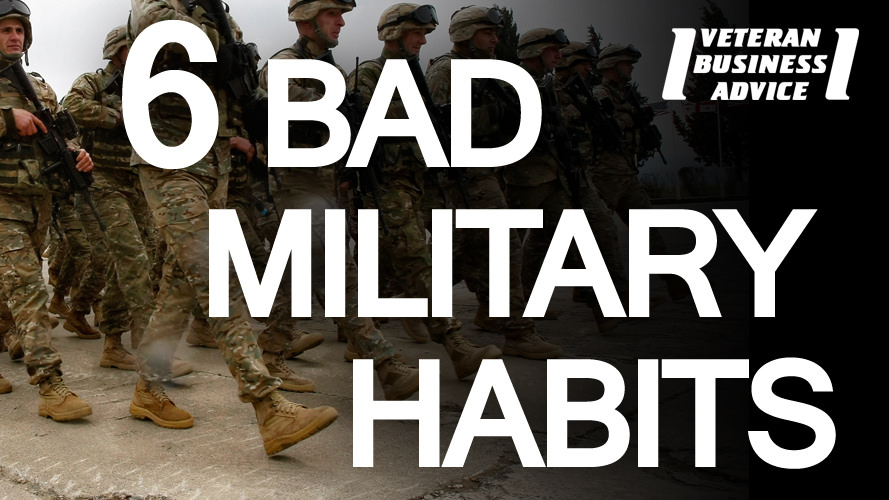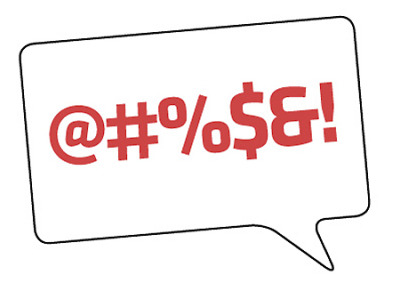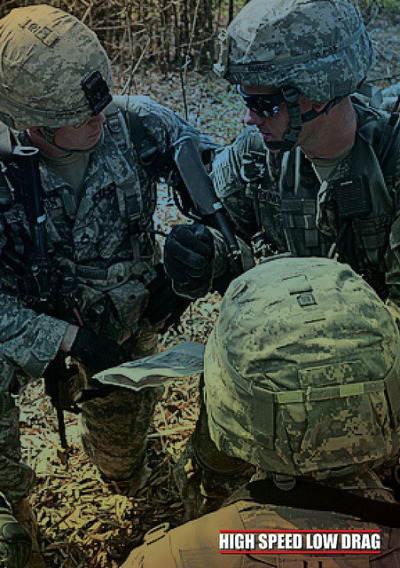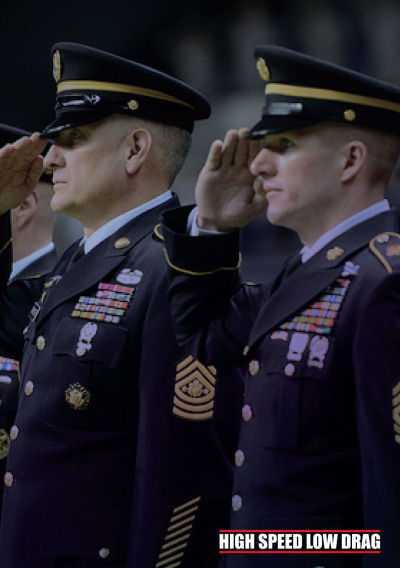 Bad habits can be picked up from anywhere.
Bad habits can be picked up from anywhere.
Even in the military.
As a guy who served in the military for a number of years, along with John Lee Dumas, the co-founder of High Speed Low Drag and a fellow veteran, we both can attest that serving in the military has left us with a fair share of bad habits, with some harder to get rid of than others.
There are 6 bad habits that I feel I should especially bring up.
Every veteran needs to be aware of what they are.
By knowing what these 6 bad military habits are, you can decide to take active steps to change them or if you do decide not to change them, you may be open to the realization that they might be holding you back and at least be careful about when to let them show.
Click here to watch the video – Six Bad Military Habits on Youtube.
What are these 6 bad habits? Allow me to enumerate:
1. Language
- Bad Language
A popular complaint against military men and veterans is their propensity for using bad language. The reputation for most of us is that we have mouths like sailors.
Being in relatively uncomfortable situations- such as being on a boat or deployed in an unfamiliar area for six months at a time- can cause people to become very curt.
 Language became very direct with colorful adjectives thrown in such as “friggin”.
Language became very direct with colorful adjectives thrown in such as “friggin”.
Bad language can become a problem when one gets out of the military and goes back into the civilian world. Most people do not talk this way and may think that doing so is a sign of ignorance and being uneducated.
If you find yourself doing that, it may be best to revisit books that are free from colorful jargon. Reading will help you redevelop your vocabulary
- Using unfamiliar acronyms
Swearing is not the only military bad habit that falls under language. The use of acronyms that are familiar in the military but are not in real life, is another one.
Veterans may be guilty about sprouting acronyms all over the place, not realizing that most people will absolutely have no idea what these acronyms and shortcuts mean.
Each veteran must learn how to better translate his skillset using civilian terminology. Never take for granted that most civilian have no idea what many military phrases and jargon mean so it is best to explain terms that could be misunderstood, even if the person you are talking to seems to nod and go along.
 2. Following Orders
2. Following Orders
The military has serious consequences for anyone who does not follow orders. Military men could get discharged or sanctioned.
At the very beginning of military training is boot camp. Boot camp is basically a place where leaders try to break enlistees down and making them learn how to follow orders without question.
These heavy repercussions and the training have made veterans very quick to follow orders even on the outside world.
Following orders blindly in the civilian world may not be such a positive trait. Veterans need to remember that the situation is highly different than in the military- where leaders pretty much had your back.
In the civilian world, one has to be wary of internal politics that may already be in place. Sometimes the chain of command that is so clear cut in the military may not be very apparent.
Each veteran must look at the bigger picture and learn to examine orders before following them automatically. Learn to question orders and find out whose interests are at play at a particular situation.
It is equally important to understand that sometimes, following orders can get you in trouble.
3. Reliance on Institutional Support
The army has different organizations that offer its members institutional support. A military man could always count on having the base, the PX and a reliable medical system to name a few.
If you were deployed, there was the air unit, the ground unit and even the navy getting you from point to point.
Individuals in the army become a cog in the system- which is good because it allows them to specialize and make things happen.
The problem lies in the reality that once one leaves the military, everything can be chaos. There aren’t all of these systems in place.
To cite an example, even healthcare can be difficult to come by.
Every veteran needs to understand that it is okay to encounter chaos. He or she just needs to create his own order especially when it comes to budgeting.
The usual case is that those who are in the military enjoyed a larger discretionary income.
Certain needs such as food, housing and healthcare were taken care of by the military. This allowed more freedom in spending the money that one earned in whichever way he pleased.
Things are highly different in the civilian world. Budgeting is required. Each veteran is responsible for taking care of his insurance, his food, his housing needs, healthcare and other various needs.
Each veteran needs to learn how to save for himself. A man who has been in the military for 10 or 20 years may have never thought about these things but it is undeniable that he needs to start thinking about all of this now.
 4. An Expectation of Respect
4. An Expectation of Respect
Individuals who especially have ranks in the military are given instant respect. Put on those captain bars and immediately the men and women who are under you in rank have to salute you and speak to you in a certain manner.
In the civilian world there is still somewhat a system but they do not involve those bars anymore. The system is very much based on the way people dress, people talk and how they choose to present themselves.
With that said, every veteran needs to understand that if he wants to be treated in a certain manner then he has to put his best foot forward.
In the military, everyone is made to understand the differences between different ranks. However, in the real world, it is safe to assume that most will not even know the difference between a captain and a sergeant. Age is also another factor that is used to identify those who may have served longer.
No such thing exists outside the military. It is not unusual to report to someone who is twenty years your junior.
Respect in the civilian world is not all about rank. Rather it is more about earning it.
Building respect up can be tough. It can take a while and involve swallowing ones pride but it is still very possible to earn the respect of others.
5. Treatment of Subordinates
If a higher ranked officer gave the men under him orders then he could expect that order to be carried out with no questions. People like the staff sergeant would assign that particular task to other men and at the end of the day could be counted on to make things happen.
Things do not really operate in this manner in the real world. It can be touch to get others to follow orders, especially if they do not report to you.
When working with others in a team, you may ask someone to do something and have them say they will do it only to find out a few days later that they don’t. Even if technically this person is in a lower place in the company than you, you can’t just yell at them. You may get fired if you do that.
For many veterans who are also not used to working with women, the transition can also be a challenge. The directness that is so common in the military may not go over well with some women.
Veterans have to learn to treat people in a gentler manner and not be so rough. Veterans may need to go back to school and learn modern management techniques- how to work with people, how to negotiate, how to clearly express what needs to be done and the deadlines that need to be met.
 6. Reliance on Unit PT
6. Reliance on Unit PT
In the military there was at least a dedicated hour that was used to keep the body in shape. This just doesn’t exist in the real world.
While there are some companies who will be willing to pay for a gym membership, no one is going to force you to use that gym membership.
Keeping the body in shape is so important and connected to keeping the mind in shape. They are interconnected and so each veteran needs to take an active role in making sure that he continues to maintain his body.
Another important point to bring up is the importance of nutrition. There are so many men from the military who eat unhealthily- donuts, beer and all sorts of junk food and think they can maintain their physique because of the rigorous training that they receive.
To put in bluntly, there is no rigorous training outside the military unless you choose to get it yourself. No one will make you get up and burn those donuts unless you make the choice to do so.
The key is to achieve a balance between exercise and nutrition. Go find a place where you can learn the fundamentals of working out. Do your research and find out how to eat right.
Ultimately the way to overcome these bad habits is to have an open mind. Have an open mind on how you can improve yourself and your lifestyle. When you do that, these 6 bad habits should become a thing of the past in no time.
Click here to watch the video – Six Bad Military Habits on Youtube.
